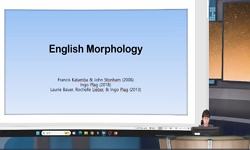The purpose of this study is to investigate two processes of word formation and storage. In order to do this, I deal with two kinds of word formation (a rule-based approach and an analogy-based approach), and examines the relationship between word for...
http://chineseinput.net/에서 pinyin(병음)방식으로 중국어를 변환할 수 있습니다.
변환된 중국어를 복사하여 사용하시면 됩니다.
- 中文 을 입력하시려면 zhongwen을 입력하시고 space를누르시면됩니다.
- 北京 을 입력하시려면 beijing을 입력하시고 space를 누르시면 됩니다.
https://www.riss.kr/link?id=A105630518
- 저자
- 발행기관
- 학술지명
- 권호사항
-
발행연도
2018
-
작성언어
Korean
- 주제어
-
등재정보
KCI등재
-
자료형태
학술저널
- 발행기관 URL
-
수록면
143-160(18쪽)
- 제공처
-
0
상세조회 -
0
다운로드
부가정보
다국어 초록 (Multilingual Abstract)
The purpose of this study is to investigate two processes of word formation and storage. In order to do this, I deal with two kinds of word formation (a rule-based approach and an analogy-based approach), and examines the relationship between word formation and the lexicon. The rule-based approach, which Halle (1973) and Aronoff (1976) propose, describes and explains that words are formed by rules. Constraints or filters are used in order to avoid overgeneration in word formation. Formed words are listed in the mental lexicon which functions only as a storage. On the other hand, the analogy-based approach, suggested by Bybee (1985, 1988, 1995), illustrates that words are formed by analogy with respect to lexical relatedness. While the rule-based approach ignores the role of the lexicon, the analogy-based approach strengthens its role in word formation. As for the relationship between word formation and the lexicon, I show that there is a distinction between the lexicon and lexical component. The former is regarded as a storage, whereas the latter as a word-formation component. Thus, they are different modules.
목차 (Table of Contents)
- 1. 서론
- 2. 규칙 형성
- 3. 유추 형성
- 4. 어휘부
- 5. 결론
- 1. 서론
- 2. 규칙 형성
- 3. 유추 형성
- 4. 어휘부
- 5. 결론
- References
동일학술지(권/호) 다른 논문
-
- 한국중원언어학회
- Sook Heo
- 2018
- KCI등재
-
- 한국중원언어학회
- 정나영(Nayoung Jeong)
- 2018
- KCI등재
-
- 한국중원언어학회
- 편집부(편집자)
- 2018
- KCI등재
-
Effects of Flipped Classroom on University Students’ Academic Self-Efficacy
- 한국중원언어학회
- Kyong-Hyon Pyo
- 2018
- KCI등재





 DBpia
DBpia






